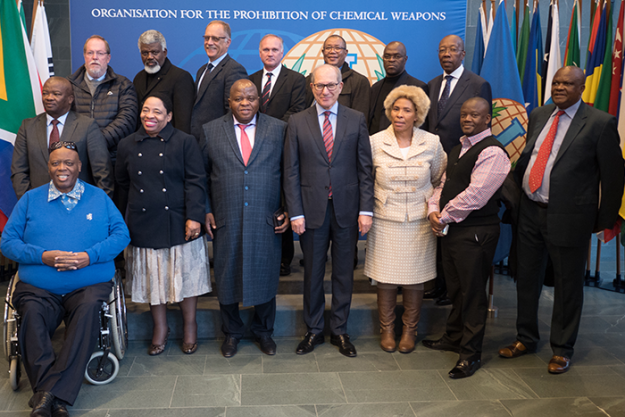
A senior delegation of the Parliamentary Committee on Intelligence from South Africa visiting the OPCW
THE HAGUE, Netherlands — 18 January 2018 — A senior delegation of the Parliamentary Committee on Intelligence from South Africa visited today the Organisation for the Prohibition of Chemical Weapons (OPCW), to gain insight into the Organisation’s current and future priorities for upholding the international ban on chemical weapons.
The delegation led by the Whip of the Committee, Mr James Skosana, met with OPCW’s Director-General, Ambassador Ahmet Üzümcü, who presented the key developments in OPCW’s current work and outlined the vision for its future activities. He highlighted the Organisation’s growing role in strengthening the prevention of the re-emergence of chemical weapons and its continuous attention to building the capacity of States Parties from Africa.
The delegation also included: Ms Zephroma Dlamini-Dubazana; Mr Russel Cebekulu; Mr Dennis Dumisani Gamede; Mr Donald Mlindwa Gumede; Mr Bantubonke Holomisa; Mr Herman Groenewald; Mr Sibusiso Christopher Mncwabe; Mr Phello Parkies; Mr Hendrik Schmidt; Mr Dirk Stubbe; Ms Tabiso Wana; and Mr John Sefako.
The delegation was accompanied by Deputy Permanent Representative of South Africa to the OPCW, Mr Gaylord Ngcobo.
Background
As the implementing body for the Chemical Weapons Convention, the OPCW oversees the global endeavour to permanently eliminate chemical weapons. Since the Convention’s entry into force in 1997 – with its 192 States Parties – it is the most successful disarmament treaty eliminating an entire class of weapons of mass destruction.
Over 96 per cent of all chemical weapon stockpiles declared by possessor States have been destroyed under OPCW verification. For its extensive efforts in eliminating chemical weapons, the OPCW received the 2013 Nobel Prize for Peace.
